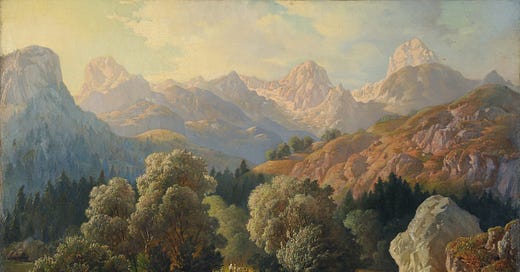“Where do you get your ideas?”
This is the question that most writers dread having to answer. They will evade with humor and change the subject as quickly as possible. But I’d actually like to share part of the origin story for Inner Wilderness Unlimited — not because I think it’s that fascinating, but because I want to give credit where credit is due, and because I think this little piece of the puzzle is a beautiful jumping off point.
The themes and — let’s call it “philosophy” for lack of a better word — that underpin Inner Wilderness Unlimited have been present in my life for as long as I can remember. They are, as people like to say, “part of my DNA.” But although I occasionally wove them into a piece of writing here and there, I had never thought to build a body of work around them. Until now.
I can pinpoint the exact words that acted as a catalyst to the coalescing of my random thoughts into something slightly more coherent. They are from The Book of Delights by Ross Gay. I bought this slim volume of essays after hearing Krista Tippet interview Gay on the wonderful podcast, On Being. I started reading it in August of 2020, but didn’t finish until June of 2023 — not because I didn’t enjoy it, but because it was one of those books that I just picked up once in a while when I needed a little comfort.
At some point during those three years, I read this snippet from chapter 14, which is titled “Joy Is Such a Human Madness” (a quote from Zadie Smith). Gay writes:
Among the most beautiful things I’ve ever heard anyone say came from my student Bethany, talking about her pedagogical aspirations or ethos, how she wanted to be as a teacher, and what she wanted her classrooms to be: “What if we joined our wildernesses together?” Sit with that for a minute. That the body, the life, might carry a wilderness, an unexplored territory, and that yours and mine might somewhere, somehow, meet. Might, even, join.
Gay goes on to ask if perhaps the densest parts of our inner wilderness—“thickets, bogs, swamps, uncrossable ravines and rivers …”—represent our sorrow, both the personal tragedies and losses as well as the ever-lurking existential dread that slinks along behind the unavoidable knowledge that, in the end, we — and all that we love — will die.
I know. It sounds more than a bit dark, but in the end, Gay suggests that finding the points of connection in these sharp, thorny, swampy parts of our inner landscape is actually a way to kindle joy.
Who would have guessed?
The hard truth is that terror and joy, grief and delight live side by side. You can’t have light without dark, shine without shadow. You can’t exorcize one thing without sacrificing the other. Life is lived in the balance between the extremes.
But in general, we tend to own up only to the pretty parts that make us look like we know what the hell we’re doing. We share only the palatable parts because we believe that’s what makes us more acceptable to other people.
And so each of us sits alone, hiding the sticky, scary parts of our inner wilderness, assuming everyone else has an inner landscape that is perfectly cultivated and manicured.
Nothing could be further from the truth.
I believe that anger, grief, intolerance, regret, and general apathy are often at least partially the result of being unable to recognize or express our true selves “out loud” for fear of either offending someone else or making ourselves vulnerable.
Your inner wilderness is complex, enormous, and … well … wild. It holds all your grief and joy, and also all your memories, stories, dreams, experiences, wishes, fears, shame, hope, love, and so on.
That’s a lot to explore. A LOT.
But if you found the courage to trek into this world, how might what you learn change the way you see yourself?
Would it help you love yourself more? Trust yourself more?
What kind of clarity might you gain about how you want to live your “one wild and precious life” as the poet Mary Oliver puts it?
Would you feel more confident? Ask bigger questions? Make your art?
Inner Wilderness Unlimited is about bushwhacking your way back to your own heart — to the core of who you are (and why), to the things you love, and to a life you love.
When you engage with your inner wilderness, you engage with the Universe. And, in my experience, when you start paying attention, you will catch the Universe winking at you more often, which is pretty damn fun.
So, slip a notebook and pen into your pocket.
They will be your passport and key.
Press your observations and thoughts between the pages like wildflowers or scraps of love letters you found fluttering along the curb in an autumn wind.
Look for clues. Pay attention to synchronicity. Listen.
Make a map, but know it’s a map you can never finish. It will just keep expanding as you learn and grow and become more yourself.
Write things down. Think about them.
Because what you think matters. What you hope matters. What you make matters.
It matters that you are here. The world is better because you’re in it.
You are connected to everything and a part of everything.
And even when you feel like you’re lost in the wilds, you are not alone.





I'm sold. I absolutely love the imagery in your writing, and I'm so excited to read the rest. Subscribed 💙
Inner wildness is such a powerful image! It's like the unseen soul behind your imagery. So glad to have come across you here:) Looking forward to reading more.